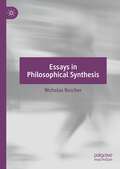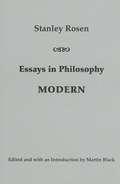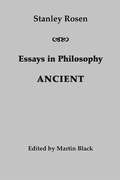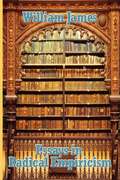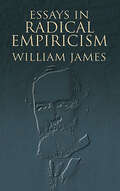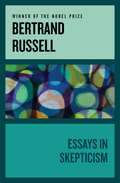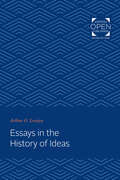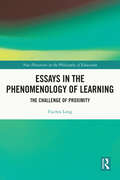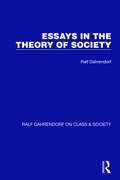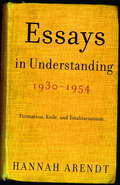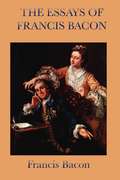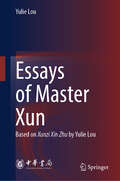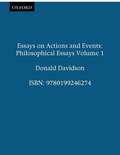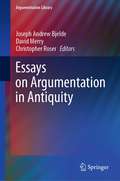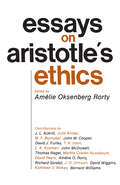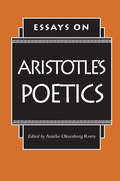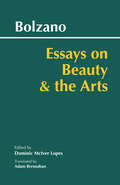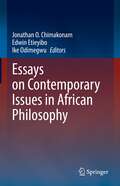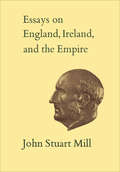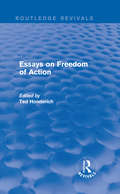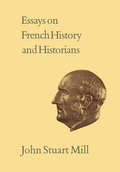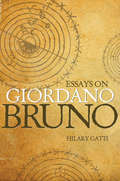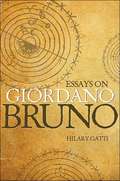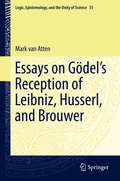- Table View
- List View
Essays in Philosophical Synthesis
by Nicholas RescherThis book presents a series of coordinated studies that explain and illustrate how philosophy must be developed systematically with its problems and topics bound together by links of reciprocal interconnection.The book consists of two parts: The first part consists of a series of case studies which illustrate how philosophical issues do not remain in neatly separated compartments but reach out in interrelationship with one another. The second part analyzes the principle resources of philosophical methodology and shows in detail how and why they can only be implemented in a systemically interrelated manner. Overall, the book demonstrates and illustrates the systemic and holistic nature of philosophical inquiry.
Essays in Philosophy: Modern
by Stanley RosenThis collection testifies to the remarkable range of Stanley Rosen's learning and reflection in the history of philosophy, both ancient and modern. The publication of these essays, with all their speculative depth and richness, is truly a great philosophical benefit. It will throw new light on Rosen's thinking on many topics in metaphysics and political philosophy and on his readings of Plato, Kant, Hegel, Nietzsche, Heidegger, Kojève, Strauss, and other figures.
Essays in Philosophy: Ancient
by Stanley Rosen Martin BlackThe essays were selected from articles, chapters, and unpublished lectures that were composed over the last five decades. They are distributed into two volumes by their focus upon ancient and modern themes, a convenient division that is not meant to imply a doctrinal chasm.
Essays in Radical Empiricism
by William JamesWilliam James believed that events could not be catalogued simply as a series of facts, but had to be considered through the lens of experience. Thus each person affects and modifies their own reality based on their own unique experiences and points of view. Ultimately you can quantify facts, but only if you understand how the person looking at these facts will affect and change them.
Essays in Radical Empiricism
by William JamesThe influential philosopher's preoccupation with ultimate reality and his turn toward a metaphysical system are the focus of Essays in Radical Empiricism. Originally published in journals between 1884 and 1906, these 12 essays were selected by William James to illustrate the doctrine he called "radical empiricism" -- a concept that made him the center of a new philosophic approach.Proclaiming experience to be the ultimate reality, James explores the applications of experience to the problem of relations, the role of feeling in experience, and the nature of truth. He argues in favor of a pluralistic universe, denying that experience can be defined in terms of an absolute force determining the relationships between things and events. Relationships, regardless of whether they hold things together or apart, are as real as the things themselves -- their functions are real, and there are no hidden factors responsible for life's harmonies and dissonances.Seminal essays in this collection include "Does Consciousness Exist?: "The Essence of Humanism," and "Absolutism and Empiricism." In addition, this edition features a new translation of "On the Notion of Consciousness" -- the first English rendering of the essay, which was written in French. Indispensable to an understanding of the great philosopher's other works, this systematic and compact treatment functions equally well in and out of the classroom.
Essays in Skepticism
by Bertrand RussellFrom one of the greatest philosophers of the twentieth century: A collection of accessible and enlightening essays on topics from envy to intellectual rubbish. Russell, the sage non-conformist, is always meaningful, no matter what the topic or the issue. In this small book are some of his old but nonetheless remarkable observations, and some of the thoughts he expressed on his 90th birthday. Here are titles, taken at random from the Table of Contents: Psychoanalysis Takes a Look; Envy and Belief; On Male Superiority; What Social Science Can Do; Intellectual Rubbish; Don&’t Be Too Certain; On Being Old.
Essays in Skepticism
by Bertrand RussellFrom one of the greatest philosophers of the twentieth century: A collection of accessible and enlightening essays on topics from envy to intellectual rubbish. Russell, the sage non-conformist, is always meaningful, no matter what the topic or the issue. In this small book are some of his old but nonetheless remarkable observations, and some of the thoughts he expressed on his 90th birthday. Here are titles, taken at random from the Table of Contents: Psychoanalysis Takes a Look; Envy and Belief; On Male Superiority; What Social Science Can Do; Intellectual Rubbish; Don&’t Be Too Certain; On Being Old.
Essays in the History of Ideas
by Arthur O. LovejoyOriginally published in 1948. In the first essay of this collection, Lovejoy reflects on the nature, methods, and difficulties of the historiography of ideas. He maps out recurring phenomena in the history of ideas, which the essays illustrate. One phenomenon is the presence and influence of the same presuppositions or other operative "ideas" in very diverse provinces of thought and in different periods. Another is the role of semantic transitions and confusions, of shifts and of ambiguities in the meanings of terms, in the history of thought and taste. A third phenomenon is the internal tensions or waverings in the mind of almost every individual writer—sometimes discernible even in a single writing or on a single page—arising from conflicting ideas or incongruous propensities of feeling or taste to which the writer is susceptible. These essays do not contribute to metaphysical and epistemological questions; they are primarily historical.
Essays in the Phenomenology of Learning: The Challenge of Proximity (New Directions in the Philosophy of Education)
by Fiachra LongThis book explores the phenomenology of learning with particular focus on the ‘closeness’ or ‘proximity’ of the knowledge that impacts on learners, young and old. Studying the power of learning to transform human beings, this book offers an in-depth discussion of how different phenomenologists understand this ‘proximate’ power. It draws on ideas of encounter from Husserl, care from Heidegger, bodily learning from Merleau-Ponty, language from Foucault, omnipotence from Winnicott and recognition from Honneth. The book examines how phenomenological insight can explain the character of radical learning. The book will appeal to academics and post-graduate students in the fields of philosophy of education, educational psychology, teaching, and learning.
Essays in the Theory of Society (Ralf Dahrendorf on Class & Society #2)
by Ralf DahrendorfOriginally published in 1968, these ten essays by one of Europe’s leading sociological theorists deal with important issues on the borderline between sociology and social philosophy and demonstrate the author’s deep insight into history and political analysis. The author maintains that the structures of power in which the political process takes place not only originate change and give it direction, but also produce the fertile conflicts that give expression to the fundamental uncertainty of human existence. Through an examination of various concepts inherent in this dynamic process – power, resistance, conflict, change, freedom, uncertainty – a coherent theory of society emerges.
Essays in Understanding, 1930-1954
by Hannah ArendtAlthough she herself rejected the title, Hannah Arendt is widely considered one of the foremost political philosophers of her time. This book collects 41 examples of her writings from the first two decades of her career, in exile in Paris in the 1930s and as an émigré to the United States in the 1940s. In the essays, she grapples with the philosophical ideas of Augustine, Kafka, Kierkegaard, Heidegger and others; considers the nature of communism, fascism, and totalitarianism; critiques social science techniques and assumption; and explores the relationship between religion and politics; among other wide-ranging topics. This is a paperbound edition of a work first published in 1994. Annotation ©2006 Book News, Inc. , Portland, OR (booknews. com)
Essays of Francis Bacon
by Francis BaconThis collection contains fifty-eight essays, published at various times between 1597 and 1625, on subjects ranging among state policy, personal conduct, and the appreciation of nature. Bacon has been referred to as the founder of modern inductivism and prophet of the industrial revolution, and all forms of knowledge are subjected to the interpretation of Bacon's views on life.
Essays of Master Xun: Based on Xunzi Xin Zhu by Yulie Lou
by Yulie LouThis is the first book written by Chinese scholars with more accurate interpretation of Master Xun’s philosophy and quoted texts from other Chinese classics. Master Xun is one of the greatest Confucian philosophers of the classical period in China. His thought has been exercising a profound impact on ideology, academic research, social and political system, ritual and moral principles, as well as the practical aspects of personal self-cultivation, education and learning. After reading the book, the readers will understand thoroughly the ancient Chinese philosophy.
Essays On Actions And Events
by Donald DavidsonDonald Davidson has prepared a new edition of his classic 1980 collection of Essays on Actions and Events, including two additional essays. In this seminal investigation of the nature of human action, Davidson argues for an ontology which includes events along with persons and other objects. Certain events are identified and explained as actions when they are viewed as caused and rationalized by reasons; these same events, when described in physical, biological, or physiological terms, may be explained by appeal to natural laws. The mental and the physical thus constitute irreduciblydiscrete ways of explaining and understanding events and their causal relations. Among the topics discussed are: freedom to act; weakness of the will; the logical form of talk about actions, intentions, and causality; the logic of practical reasoning; Hume's theory of the indirect passions; and the nature and limits of decision theory. The introduction, cross-references, andappendices emphasize the relations between the essays and explain how Davidson's views have developed.
Essays on Argumentation in Antiquity (Argumentation Library #39)
by Joseph Andrew Bjelde David Merry Christopher RoserThis book provides a collection of essays representing the state of the art in the research into argumentation in classical antiquity. It contains essays from leading and up and coming scholars on figures as diverse as Parmenides, Gorgias, Seneca, and Classical Chinese "wandering persuaders." The book includes contributions from specialists in the history of philosophy as well as specialists in contemporary argumentation theory, and stimulates the dialogue between scholars studying issues relating to argumentation theory in ancient philosophy and contemporary argumentation theorists. Furthermore, the book sets the direction for research into argumentation in antiquity by encouraging an engagement with a broader range of historical figures, and closer collaboration between contemporary concerns and the history of philosophy.
Essays on Aristotle's Ethics (Philosophical Traditions #2)
by Amélie Oksenberg RortyAristotle's Nicomachean Ethics deals with character and its proper development in the acquisition of thoughtful habits directed toward appropriate ends. The articles in this unique collection, many new or not readily available, form a continuos commentary on the Ethics. Philosophers and classicists alike will welcome them.
Essays on Aristotle's Poetics
by Amélie Oksenberg RortyAimed at deepening our understanding of the Poetics, this collection places Aristotle's analysis of tragedy in its larger philosophical context. In these twenty-one essays, philosophers and classicists explore the corpus of Aristotle's work in order to link the Poetics to the rest of his views on psychology and on history, ethics, and politics. The essays address such topics as catharsis, pity and fear, pleasure, character and the unity of action, and the modality of dramatic action. In addition to the editor, the contributors are Elizabeth Belfiore, Rdiger Bittner, Mary Whitlock Blundell, Wayne Booth, Dorothea Frede, Cynthia Freeland, Leon Golden, Stephen Halliwell, Richard Janko, Aryeh Kosman, Jonathan Lear, Alexander Nehamas, Martha C. Nussbaum, Deborah Roberts, G.E.M. de Ste. Croix, Nancy Sherman, Jean-Pierre Vernant, Stephen A. White, and Paul Woodruff.
Essays on Beauty and the Arts (Hackett Classics)
by Bernard BolzanoBernard Bolzano&’s (1781–1848) writings in aesthetics are clear, concise, and explicit about method. Provocative and revisionary, they champion broad views of beauty, the arts, and their social function. Dominic McIver Lopes's introductory materials place Bolzano's essays in context, give them a new interpretation, and map out how to teach them, in full or in part, in a variety of courses.
Essays on Contemporary Issues in African Philosophy
by Jonathan O. Chimakonam Edwin Etieyibo Ike OdimegwuThis volume is a collection of chapters about contemporary issues within African philosophy. They are issues African philosophy must grapple with to demonstrate its readiness to make a stand against some of the challenges society faces in the coming decade such as xenophobia, Afro-phobia, extreme poverty, democratic failure and migration. The text covers new methodical directions and there is focus on the conversationalist, complementarist and consolationist movements within the field as well as the place of the Indigenous Knowledge System.The collection speaks to African philosophy’s place in intellectual history with coverage of African Ethics and African socio-political philosophy. Contributors come from a variety of different backgrounds, institutions and countries. Through their innovative ideas, they provide fresh insight and intellectual energy. The book appeals to philosophy students and researchers.
Essays on England, Ireland, and Empire: Volume VI
by John Robson John Stuart Mill Joseph HamburgerJohn Stuart Mill's political essays are a blend of the practical and the theoretical. In this volume are gathered together those in which the practical emphasis is more marked; those in which theory is predominant are found in Essays on Politics and Society, Vols XVIII and XIX of the Collected Works. The Essays on England, Ireland, and the Empire are mainly from Mill's early career as a propagandist for the Philosophic Radicals (a term he himself coined). They provide a contemporary running account of British political issues at home and abroad, with a vigorous and sometimes acerbic commentary. Historians as well as political scientists will find interesting details of the view from the radical side, and all students of Mill will welcome the further elucidation of his development. Of special interest are his precocious if tendentious attack on Hume's History of England, and his reactions to Canadian and Irish issues, the latter being the subject of a previously unpublished manuscript. The textual apparatus includes a collation of the manuscript materials and identification of Mill's quotations and references.
Essays on Freedom of Action (Routledge Revivals)
by Ted HonderichEssays on Freedom of Action, first published in 1973, brings together original papers by contemporary British and American philosophers on questions which have long concerned philosophers and others: the question of whether persons are wholly a part of the natural world and their actions the necessary effects of causal processes, and the question of whether our actions are free, and such that we can be held responsible for them, even if they are the necessary effects of casual processes. This volume will be of interest not only to those who are primarily concerned with philosophy but also to students in those many other disciplines in which freedom and determinism arise as problems.
Essays on French History and Historians: Volume XX
by John C. Cairns John Robson John Stuart MillJ.S. Mill's deep interest in French intellectual, political, and social affairs began in 1820 when, in his fourteenth year, he went to France to live for a year with the family of Sir Samuel Bentham. French became his second language, and France his second home, where he died and was buried in 1873. His interest in history began even earlier when, as a child of seven, he tried to imitate his father's labours on the History of British India; though he never wrote a history in his maturity, study of the past remained a passion and helped shape the philosophy of history that informed his views of society and ethics. His intense interest in contemporary French politics also led him to seek connections between historical developments and present trends, both seen by his from a Radical perspective approproate to what he believed to be an age of transition. The English historians of France, including Walter Scott and Thomas Carlyle, as well as the French, some of whom were themselves political figures, are judged by their historical methods, but those methods are seen as having practical effects in shaping as well as revealing the mind of the times.This volume brings together for the first time the essays, running from 1826 to 1849, that meld these abiding interests. They give as well insights into Mill's personal aspirations, his developing view of comparative politics and sociology, his concern for freedom, and his feminism. During these years Mill worked on a published his System of Logic, Book VI of which shows in condensed form the results of the speculations here developed; reading these essays with that work, which made his reputation as a philosopher, enables one to see the effects of romanticism on analytic thought in a way not as clearly evident even in Mill's Autobiography. Independently important, then, the essays in this volume also enable us to interpret anew the practical and theoretical concerns fundamental to his formative years and maturity.John C. Cairns' Introduction demonstrates how the essays reveal, through their reactions to the Revolutions of 1789, 1830, and 1848, and to French historiography, politics, and thought, the effect of France on Mill's ideas, and also the way in which his other concerns influenced his reactions to France. The texts, with the variants and notes that are the hallmark of this edition, are described in John M. Robson's Textual Introduction, which explains the editorial principles and methods.
Essays on Giordano Bruno
by Hilary GattiThis book gathers wide-ranging essays on the Italian Renaissance philosopher and cosmologist Giordano Bruno by one of the world's leading authorities on his work and life. Many of these essays were originally written in Italian and appear here in English for the first time. Bruno (1548-1600) is principally famous as a proponent of heliocentrism, the infinity of the universe, and the plurality of worlds. But his work spanned the sciences and humanities, sometimes touching the borders of the occult, and Hilary Gatti's essays richly reflect this diversity. The book is divided into sections that address three broad subjects: the relationship between Bruno and the new science, the history of his reception in English culture, and the principal characteristics of his natural philosophy. A final essay examines why this advocate of a "tranquil universal philosophy" ended up being burned at the stake as a heretic by the Roman Inquisition. While the essays take many different approaches, they are united by a number of assumptions: that, although well versed in magic, Bruno cannot be defined primarily as a Renaissance Magus; that his aim was to articulate a new philosophy of nature; and that his thought, while based on ancient and medieval sources, represented a radical rupture with the philosophical schools of the past, helping forge a path toward a new modernity.
Essays on Giordano Bruno
by Hilary GattiThis book gathers wide-ranging essays on the Italian Renaissance philosopher and cosmologist Giordano Bruno by one of the world's leading authorities on his work and life. Many of these essays were originally written in Italian and appear here in English for the first time. Bruno (1548-1600) is principally famous as a proponent of heliocentrism, the infinity of the universe, and the plurality of worlds. But his work spanned the sciences and humanities, sometimes touching the borders of the occult, and Hilary Gatti's essays richly reflect this diversity. The book is divided into sections that address three broad subjects: the relationship between Bruno and the new science, the history of his reception in English culture, and the principal characteristics of his natural philosophy. A final essay examines why this advocate of a "tranquil universal philosophy" ended up being burned at the stake as a heretic by the Roman Inquisition. While the essays take many different approaches, they are united by a number of assumptions: that, although well versed in magic, Bruno cannot be defined primarily as a Renaissance Magus; that his aim was to articulate a new philosophy of nature; and that his thought, while based on ancient and medieval sources, represented a radical rupture with the philosophical schools of the past, helping forge a path toward a new modernity.
Essays on Go del's Reception of Leibniz, Husserl, and Brouwer
by Mark AttenThis volume tackles Gödel's two-stage project of first using Husserl's transcendental phenomenology to reconstruct and develop Leibniz' monadology, and then founding classical mathematics on the metaphysics thus obtained. The author analyses the historical and systematic aspects of that project, and then evaluates it, with an emphasis on the second stage. The book is organised around Gödel's use of Leibniz, Husserl and Brouwer. Far from considering past philosophers irrelevant to actual systematic concerns, Gödel embraced the use of historical authors to frame his own philosophical perspective. The philosophies of Leibniz and Husserl define his project, while Brouwer's intuitionism is its principal foil: the close affinities between phenomenology and intuitionism set the bar for Gödel's attempt to go far beyond intuitionism. The four central essays are `Monads and sets', `On the philosophical development of Kurt Gödel', `Gödel and intuitionism', and `Construction and constitution in mathematics'. The first analyses and criticises Gödel's attempt to justify, by an argument from analogy with the monadology, the reflection principle in set theory. It also provides further support for Gödel's idea that the monadology needs to be reconstructed phenomenologically, by showing that the unsupplemented monadology is not able to found mathematics directly. The second studies Gödel's reading of Husserl, its relation to Leibniz' monadology, and its influence on his publishe d writings. The third discusses how on various occasions Brouwer's intuitionism actually inspired Gödel's work, in particular the Dialectica Interpretation. The fourth addresses the question whether classical mathematics admits of the phenomenological foundation that Gödel envisaged, and concludes that it does not. The remaining essays provide further context. The essays collected here were written and published over the last decade. Notes have been added to record further thoughts, changes of mind, connections between the essays, and updates of references.
